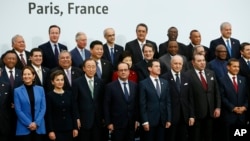European Union environment ministers in Brussels have unanimously approved the ratification of the 2015 Paris agreement on climate change. The EU needs to sign off on the deal so it can have a seat at the table during climate discussions scheduled for November in Marrakech, Morocco.
The European Parliament will vote on the climate accord Tuesday. The action will be followed by a fast track procedure to obtain written approval from heads of state.
For the climate deal to take effect, 55 countries that collectively produce 55 percent of global greenhouse emissions must sign on to it. After one month, the agreement would go into force.
Miguel Arias Canete, the EU commissioner for climate action and energy, told journalists after Friday's meeting that the unanimous decision does not undermine parliamentary votes in member states. “In view of the risk of the Paris agreement entering to force without the European Union, we have been taking this decision by unanimity. Ratifications by national parliaments are fully respected.”
The 28-member EU was eager to prove it could effectively address important issues as it faces several crises at the same time. Commissioner Arias Canete said Europe’s reputation was at stake.
“Because remember that they said that Europe is too complicated to agree quickly. They say we have too many obstacles, they say we were all talk and they even started to question whether our heart was really in it. Today clearly showed we mean business,” Canete said.
EU Commission President Jean-Claude Juncker highlighted the importance of quick ratification for the EU during his State of the Union speech in mid-September, saying, “Dragging our feet on ratification affects our credibility and makes us look ridiculous.”
Stepping up to ‘next level’
Claude Turmes, a green energy spokesman for the green parties in the EU parliament, said in a statement that urgent action is needed after ratification.
“The EU must step up to the next level and make sure it does its fair share toward reaching the objectives of the Paris agreement," Turmes said. "In particular, we will need to see much greater ambition on energy efficiency and renewables, without which we will simply not be able to honor the deal agreed last year."
The regional grouping is usually seen as a front-runner when it comes to environmental issues, climate protection and reducing emissions. So far only seven countries, including France and Germany, have approved the Paris climate deal.
Ulriikka Aarnio of Climate Action Network Europe, the largest European coalition of climate and energy organizations, says the EU will have more than just a reputation problem if it does not manage to approve the accord by next week:
“I think the biggest problem is of course that the EU would not be a party but an observer at the first meeting. There are lots of issues that are important to the EU, such as the rules and how to revise the targets where the EU of course would want to be a full decision-making party,” Aarnio said.
The 61 countries that already have signed on to the deal, including the United States, China and Brazil, represent about 50 percent of total greenhouse gas emitters. The U.S. and China alone are responsible for 38 percent of global emissions.
India is the fourth largest emitter of greenhouse gases and is set to ratify the deal in the coming days, meaning the 55 percent threshold of greenhouse gas emitters could probably be reached even without the EU on board.
During the United Nations climate change conference in Marrakech, implementation policies of the Paris accord will be set.
The Paris deal is intended to reduce carbon emissions and keep global warming below 2 degrees Celsius above pre-industrial levels. It is the first legally binding global climate agreement.





